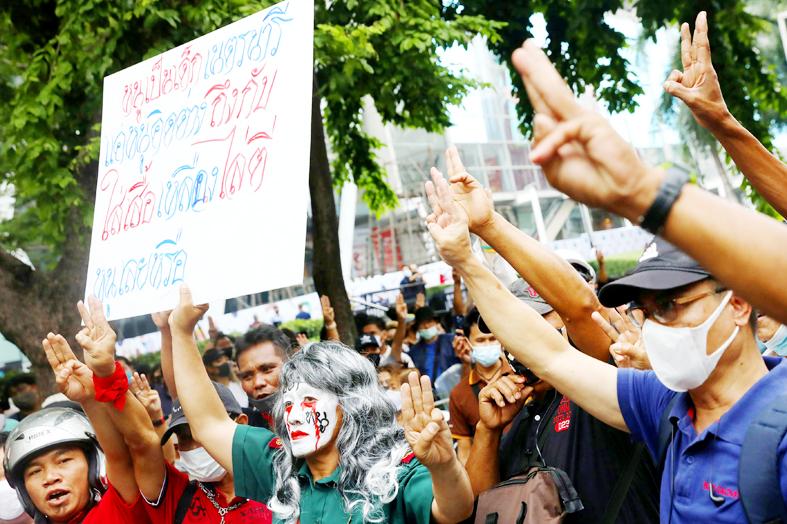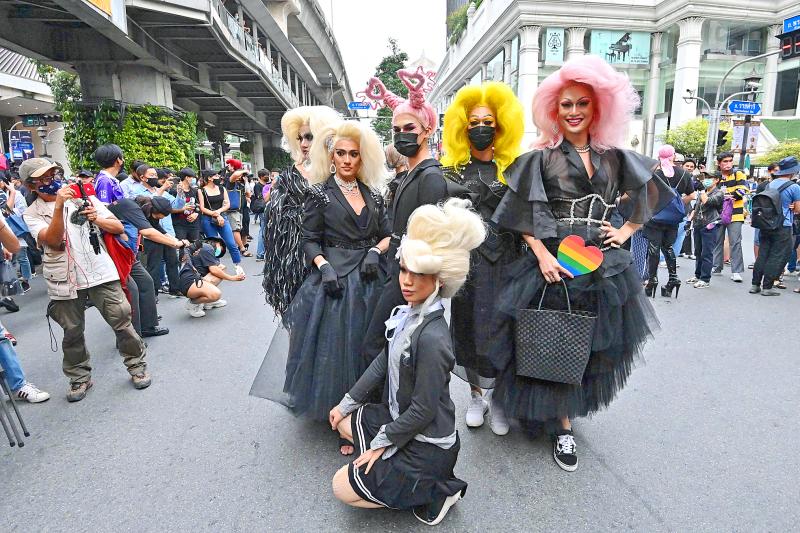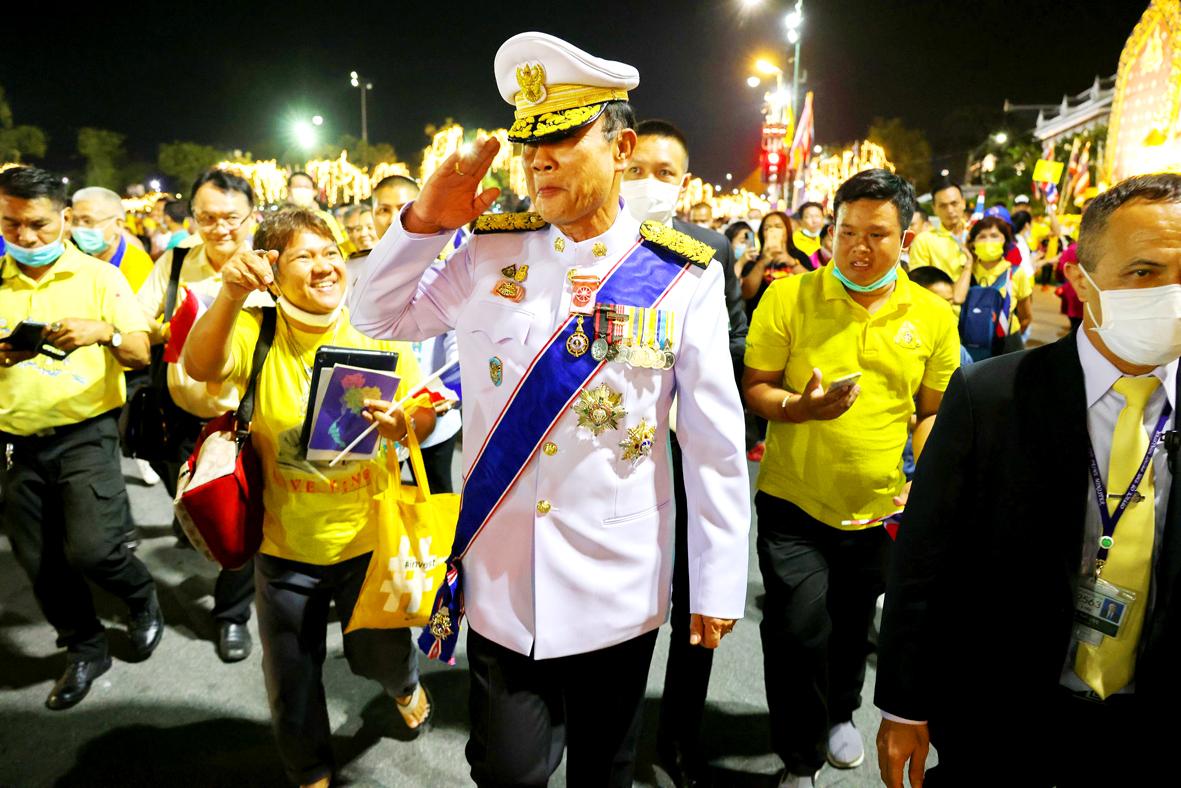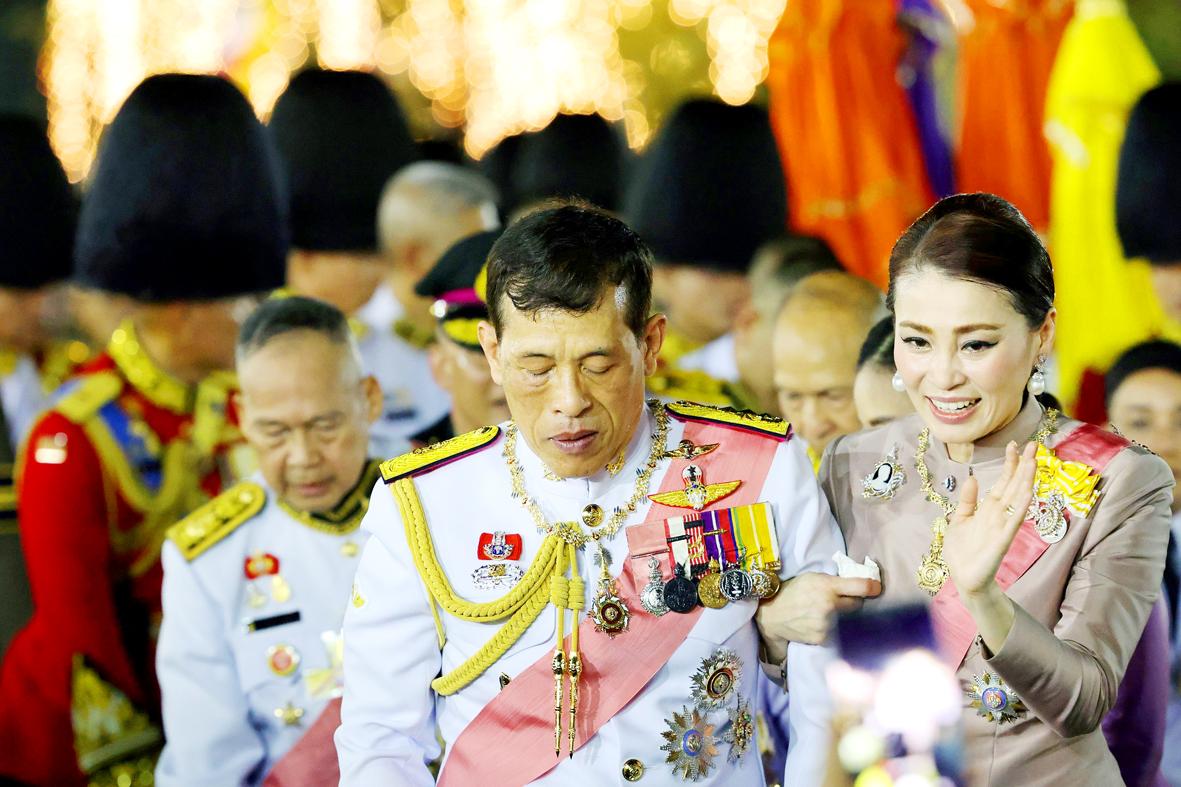Thousands of people yesterday protested in the center of Thailand’s capital, Bangkok, in the first demonstration since Thai Prime Minister Prayuth Chan-ocha ignored pro-democracy advocates’ Saturday night deadline to resign.
It was also the first major show of force since Prayuth lifted the Oct. 15 emergency measures that had been meant to stop three months of protests against the government and monarchy, but which brought tens of thousands of people onto the streets.
“If he doesn’t resign, then we must come out to ask him to quit in a peaceful way,” protest leader Jatupat “Pai” Boonpattararaksa said yesterday as people chanted “Prayuth Out.”

Photo: Reuters
The prime minister’s office posted a note on Twitter to say he was not quitting.
He has said the crisis should be discussed in parliament, which is due to hold a special session today and tomorrow, but his opponents have little faith in an assembly dominated by his supporters.
There was no sign of a major police presence around protesters at the Ratchaprasong Intersection, an emotive location for protesters as it was the scene of bloodshed in 2010 in a crackdown by security forces on anti-establishment protests.

Photo: AFP
A government spokesman said there would be no use of force and called on people to remain peaceful and respect the law.
In the relaxed atmosphere, a group of drag queens gathered at the intersection to put on a show.
Protesters are also planning to march to the German embassy today as a message to King Maha Vajiralongkorn, who is currently in Thailand, but spends much of his time in Bavaria.

Photo: Reuters
“Going to the German embassy reflects the evident problem of the king’s exercise of power is making many people uncomfortable and raises questions whether it violates the German law,” activist Piyarat “Toto” Chongthep said.
Pro-democracy advocates seek the departure of Prayuth and a new constitution.
They say that Prayuth, who led a coup in 2014 as the army chief, was returned to power unfairly in last year’s general election, because laws had been changed to favor a pro-military party.

Photo: Reuters
They say that the constitution, written and enacted under military rule, is undemocratic
They have also demanded curbs on the monarchy, saying it has enabled the military to dominate Thailand for decades.
Prayuth’s government last week called the special parliamentary session to seek to defuse weeks of almost daily protests.
“The only way to a lasting solution for all sides that is fair for those on the streets as well as for the many millions who choose not to go on the streets is to discuss and resolve these differences through the parliamentary process,” Prayuth said last week.
Prayuth remained resolute on Saturday while attending a prayer ceremony for the country at a historic Bangkok temple, saying “all problems can be solved” through compromise.
“The government has real intentions to solve problems as long as it’s under the line of laws,” he told reporters, adding that he “won’t quit.”
His critics have said that the points of discussion submitted by the government for parliament to debate dealt not with their concerns, but were thinly disguised criticisms of the protests, including the risk of COVID-19 spreading at rallies, the alleged interference with a royal motorcade by a small crowd earlier this month, and illegal gatherings and the destruction of images of the royal family.
The king has been back in Thailand for the past week and a half to commemorate a major Buddhist holiday and the death of his father, Bhumibol Adulyadej.
He has not commented on the demonstrations, but he has made rare public visits with his supporters waiting outside the palace — a charm offensive for an army of local and international media.
Thais abroad have also held demonstrations in solidarity with the student movement, with some gathering in Tokyo’s Shibuya district yesterday carrying signs that read “Prayuth get out.”
Additional reporting by AFP

South Korea would soon no longer be one of the few countries where Google Maps does not work properly, after its security-conscious government reversed a two-decade stance to approve the export of high-precision map data to overseas servers. The approval was made “on the condition that strict security requirements are met,” the South Korean Ministry of Land, Infrastructure and Transport said. Those conditions include blurring military and other sensitive security-related facilities, as well as restricting longitude and latitude coordinates for South Korean territory on products such as Google Maps and Google Earth, it said. The decision is expected to hurt Naver and Kakao

MONEY GRAB: People were rushing to collect bills scattered on the ground after the plane transporting money crashed, which an official said hindered rescue efforts A cargo plane carrying money on Friday crashed near Bolivia’s capital, damaging about a dozen vehicles on highway, scattering bills on the ground and leaving at least 15 people dead and others injured, an official said. Bolivian Minister of Defense Marcelo Salinas said the Hercules C-130 plane was transporting newly printed Bolivian currency when it “landed and veered off the runway” at an airport in El Alto, a city adjacent to La Paz, before ending up in a nearby field. Firefighters managed to put out the flames that engulfed the aircraft. Fire chief Pavel Tovar said at least 15 people died, but

THE TRAGEDY OF PUNCH: Footage of the seven-month-old Japanese macaque has gone viral online after he was rejected by his mother and formed a bond with a soft toy A baby monkey in Japan has captured hearts around the world after videos of him being bullied by other monkeys and rejected by his mother went viral last week. Punch, a Japanese macaque, was born in July last year at Ichikawa City Zoo. He has drawn international attention after zookeepers gave him a stuffed orangutan toy after he was abandoned by his mother. Without maternal guidance to help him integrate, Punch has turned to the toy for comfort. He has been filmed multiple times being dragged and chased by older Japanese macaques inside the enclosure. Early clips showed him wandering alone with

Australian Prime Minister Anthony Albanese yesterday said he did not take his security for granted, after he was evacuated from his residence for several hours following a bomb threat sent to a Chinese dance group. Albanese was evacuated from his Canberra residence late on Tuesday following the threat, and returned a few hours later after nothing suspicious was found. The bomb scare was among several e-mails threatening Albanese sent to a representative of Shen Yun, a classical Chinese dance troupe banned in China that is due to perform in Australia this month, a spokesperson for the group said in a statement. The e-mail